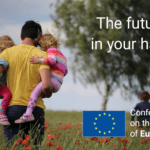Publicaciones relacionadas:
 Establishing a culture of research integrity with innovative educational methods
Establishing a culture of research integrity with innovative educational methods
 Conference on the Future of Europe: launch of the multilingual digital platform
Conference on the Future of Europe: launch of the multilingual digital platform
 The European Institute of Innovation and Technology supports the New European Bauhaus with €5 million
The European Institute of Innovation and Technology supports the New European Bauhaus with €5 million
 Scientists solve mysteries of the world’s oldest computer
Scientists solve mysteries of the world’s oldest computer
 We’re not much different than Neanderthals, new study shows
We’re not much different than Neanderthals, new study shows


Leave a Reply